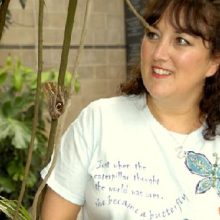WATCH YOUR CARD AS A VIDEO
Keep reaching for your dreams and ignore the inner or outer advice of “sensible, reasonable, realistic, and commonsensical” subpersonalities and interpersonal advisers. As George Bernard Shaw said, “The reasonable man adapts himself to the world; the unreasonable one persists to adapt the world to himself. Therefore, all progress depends on the unreasonable man.”
When we are not working on fulfilling our dreams — our life mission — then we are likely to feel anxiety.

Adrian, the young man in the photo, was a talented tennis player taking time off to reevaluate his dream of being a tennis champion. He stopped to look wistfully at a tennis court as we walked by it. Later, he recognized that he had more essential talents and is currently leading a fulfilling life as a psychotherapist. Meaningfulness is more important than mere survival, and meaningfulness often means working toward fulfilling your big dream — your life mission.
Life missions usually rest on the two great pillars of meaningfulness — self-development and helping others. When you have trouble locating the next step in your mission, when you neglect your mission through distraction, laziness, or self-sabotage — such as abusing your body or wasting time and other resources — then you are likely to feel anxiety or depression. Anxiety and mild (subclinical) depression can be helpful in such a case because they are the spiritual form of pain, reminding you that you are off track. Rollo May defined anxiety as “Being asserting itself against nonbeing.” Deadening the anxiety through distraction or self-medication is far worse. You need to know you’re lost to find your way. You won’t regain your path if you are so lost that you don’t even know you’re lost. So, it’s good to have anxiety about losing your dreams. I feel anxious if I neglect my life mission for even a day. When I am working toward my dreams, on the other hand, I can deal with a lot of stress and still have high morale.
If you do have a big dream, don’t fool yourself — there are few big dreams you can accomplish without an average of at least two hours of work a day. If you’ve found a big dream that is in accord with your True Will, consider this an auspicious time to keep reaching for it.
For those willing to read more on this subject, I describe many struggles to keep reaching for my dreams in my most autobiographical essay: The Path of the Numinous — Living and Working with the Creative Muse
In this essay, I recount a moment when forces from the spiritual realm seemed to help me through a difficult decision where I needed to defy some fierce dragons of doubt to keep reaching for my dreams:
On June 17, 1995, I went on the road, officially taking an approved year’s leave of absence from teaching. The decision wasn’t irreversible then; I still had about ten months to decide if I would return. Despite all the messages from the muse, this was no easy decision, as I had a tenured teaching job in the highest-paying county for teachers in the United States, where I made close to 60K a year (quite a lot for a relatively young school teacher in 1995), and the job provided health insurance, an excellent pension plan, etc. My parents and every voice of middle-class common sense and practicality urged me to return to the economic security of a profession I once loved.
I’d been on the road for ten months when the school district called, pressing me for a decision. I was traveling with some young friends with whom I had volunteered at a Navajo reservation near Big Mountain, Arizona. The little money I had from cashing out my retirement fund had long since been exhausted, and I had been living close to the edge. We were camping in a mesa near Sedona, Arizona when the morning I had to give the school district my decision arrived. With my friend Jordie as a witness, I did an I Ching reading that strongly supported leaving the teaching job. As I was finishing the reading, another member of the group I was traveling with, Seth, who knew nothing about the decision I was facing, came over to show me a Jung quote he had just encountered in a book on mountain climbing. The quote turned out to be stunningly relevant. This was the second time in my life when it felt like Jung had stepped forward as a spiritual grandfather to give me his blessing. Here is what Seth read to me:
The fact that many a man going his own way ends in ruin means nothing, he must obey his own law as if it were a daemon whispering to him of new and wonderful paths. There are not a few who are called awake by the summons of the voice whereupon they are at once set apart from the others, feeling themselves confronted with a problem about which the others know nothing. In most cases it is impossible to explain to the others what has happened, any understanding is walled off by impenetrable prejudices. ‘You are no different from anybody else,’ they will chorus. There is no such thing, or if there is such a thing it is immediately branded as morbid. He is at once set apart, isolated as he has resolved to obey the law that commands him from within. ‘His own law,’ everybody will say, but he knows better, it is the law.
The only meaningful life is the life that strives for the individual realization, absolute and unconditional, of its own particular plan. To the extent that a man is untrue to the law of his being, he has failed to realize his life’s meaning. The undiscovered being within us is a living part of the psyche. Classical Chinese philosophy names the interior way Tao, and likened it to a flow of water that moves irresistibly towards its goal. To rest in Tao means fulfillment, wholeness, one’s destination reached, one’s mission done, the beginning, end in perfect realization, the meaning of existence unique in all things.
—C.G. Jung
 ZapOracle.com home to the free 720-card Zap Oracle
ZapOracle.com home to the free 720-card Zap Oracle






